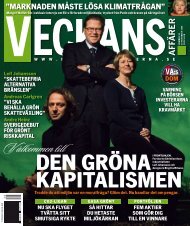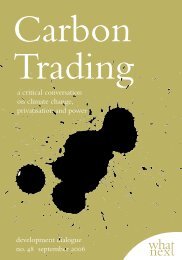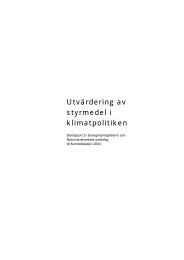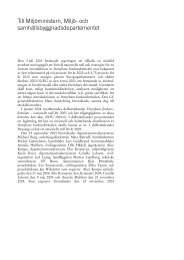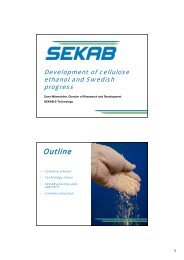Sugarcane ethanol: Contributions to climate change - BAFF
Sugarcane ethanol: Contributions to climate change - BAFF
Sugarcane ethanol: Contributions to climate change - BAFF
You also want an ePaper? Increase the reach of your titles
YUMPU automatically turns print PDFs into web optimized ePapers that Google loves.
Chapter 5<br />
in the implementation of the Pro<strong>to</strong>col. Maintaining the 2007 levels of mechanization,<br />
when 550 new harvest machines have begun <strong>to</strong> operate, it will be possible <strong>to</strong> complete the<br />
mechanization even prior <strong>to</strong> the deadline (2014) set by the Pro<strong>to</strong>col.<br />
4. Initiatives <strong>to</strong>wards <strong>ethanol</strong> certification and compliance<br />
�e discussion on sustainable production of biofuels has ful�lled the scienti�c literature<br />
lately (see for example Hill et al., 2006; Van Dam et al., 2006; Goldemberg et al., 2006; Smeets<br />
et al., 2008; Macedo et al., 2008). At the same time several initiatives are being developed in<br />
Europe and in the United States related <strong>to</strong> certi�cation, traceability and de�nition of criteria<br />
and indica<strong>to</strong>rs for sustainable production of biofuels, mainly due <strong>to</strong> di�erent supporting<br />
policies. For example in May 2003, the European Commission launched its Biofuels Directive<br />
2003/30/EC, establishing legal basis for blending biofuels and fossil fuels. �e EU member<br />
countries are urged <strong>to</strong> replace 2% of fossil fuels with biofuels by 2005 and 5.75% by 2010.<br />
From 2003 <strong>to</strong> 2005 the group of 25 countries members enhanced biofuel’s market share of<br />
0.6% <strong>to</strong> 1.4%. However, they have not yet achieved the �rst target yet. �e EU Directive<br />
2003/96/EC had also established tax incentives <strong>to</strong> encourage renewable energy use.<br />
�e government of Germany (GE), Netherlands (NL) and United Kingdom (UK) are<br />
supporting di�erent assessment studies, while another one initiative is taking place from<br />
Switzerland, the Roundtable on Sustainable Biofuels (RTB), a multiple stakeholder initiative,<br />
hosted by the Ecole Polytechnique Federale de Lausanne. �e main environmental issues<br />
addressed by these di�erent initiatives are related <strong>to</strong> greenhouse gas reduction compared<br />
with fossil fuels; competition with other land uses, especially food competition; impacts on<br />
the biodiversity and on the environment (Table 11). Considering carbon and greenhouse<br />
gases balance current agricultural and industrial practices sugarcane <strong>ethanol</strong> from Brazil<br />
does comply with the targets of greenhouse reduction higher than 79% from existing brown<br />
�elds, and from new green �elds, when not replacing large areas of native vegetation. On<br />
food competition, there is no direct evidence that sugarcane is replacing the basic Brazilian<br />
staple foods (Nassar et al., this book). On biodiversity conservation, data from São Paulo<br />
State show that sugarcane expansion did not reduce forest cover, but on the contrary (IEA/<br />
CATI – SAAESP). On the use of water, fertilizers and agrochemicals, sugarcane <strong>ethanol</strong><br />
does perform well above any other current biofuel in the market (in this chapter).<br />
In the USA, the Environmental Protection Agency (EPA) under the Energy Independence<br />
and Security Act of 2007 is responsible for revising and implementing regulations on the<br />
use of biofuels blended with gasoline. �e Renewable Fuel Standard program will increase<br />
the volume of renewable fuel required <strong>to</strong> be blended in<strong>to</strong> gasoline from 9 billion gallons in<br />
2008 <strong>to</strong> 36 billion gallons by 2022. At the same time, EPA is conducting several studies on<br />
the direct and indirect impacts of the expansion of biofuels production and their carbon<br />
footprint and potential reduction of greenhouse gases.<br />
132 <strong>Sugarcane</strong> <strong>ethanol</strong>



